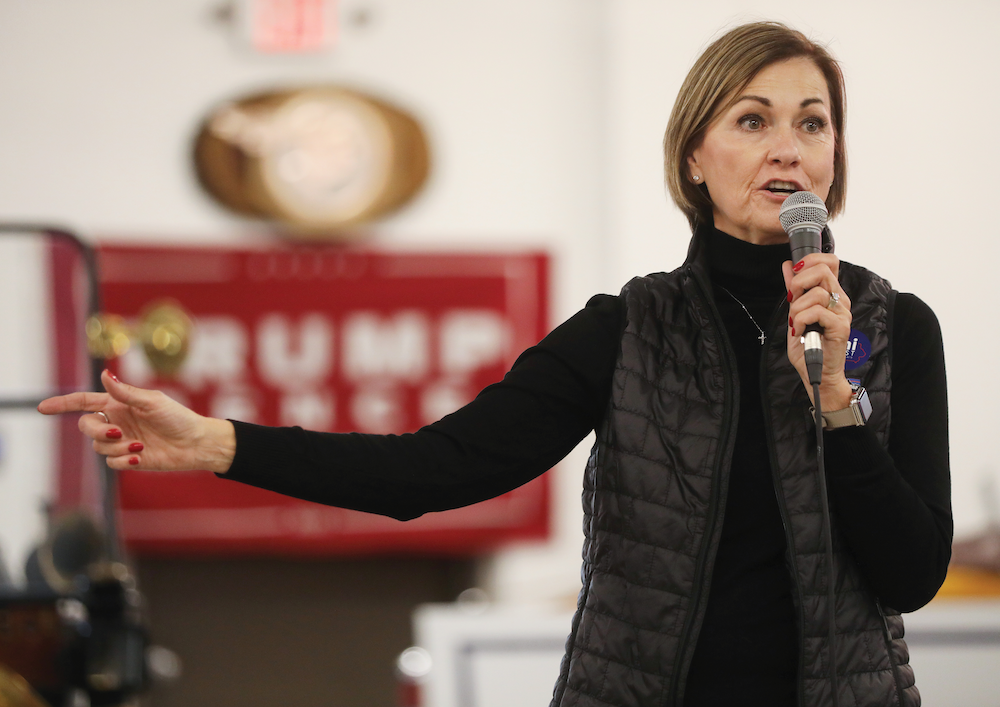Vote for who you know
Nov 2, 2022
Strong performances deserve strong turn out in these midterm elections
On Tuesday, Nov. 8, elections across the country will be held. Among the many offices that will be filled in Iowa are those for Governor, one U.S. Senator, all of Iowa’s U.S. and State Representatives and more. On such an important day, voting is critical. It is not only important to be a voter, but also to be an informed voter. In an election campaign filled with promises and ads everywhere, it is important to remember past performances when choosing a candidate. This article will analyze the track records of two of the notable incumbents that are running for reelection in Iowa.
Gov. Kim Reynolds was the Lt. Gov. from 2011 to 2017, became governor in 2017 to replace Former Gov. Terry Branstad and was elected governor in 2018. She is the first female governor in Iowa’s history. Reynolds faced a test that no Iowa governor had ever faced before, along with every other governor in the nation: how to handle the COVID-19 pandemic. In a time when nearly every state issued stay-at-home orders, Reynolds was one of the few who did not. Although some businesses were closed, and schools went virtual for a while, Iowa was one of the first states to reopen schools and businesses.
These policies of allowing Iowans to make their own informed decisions instead of forcing them to comply with state guidelines was controversial. Some enjoyed having more freedom, but others feared the health repercussions could be severe. However, according to stats from NBC News, Iowa was still below average among states in both COVID-19 death rate and total deaths. Obviously, population size and density play a role. However, keeping the state open did not cause Iowa to suffer more than many other states.
In the meantime, besides giving Iowans more personal autonomy, this also helped Iowa’s economy. According to the Bureau of Labor Statistics, Iowa’s unemployment rate during the pandemic was lower than the U.S. average. Unemployment in Iowa peaked at 10.5 percent in April, 2020, compared to the national average of 14.7 percent. By September, though, Iowa’s unemployment rate had dropped to 4.8 percent, compared to the national average of 7.9 percent. However, the U.S. average tended to be higher than Iowa before 2020, so a comparison to a similar state may be more beneficial. Minnesota has tended to have similar unemployment rates in the past. In April, Minnesota’s unemployment rates peaked at 10.8 percent. By September, their unemployment rates had dropped to 6.2 percent, higher than Iowa’s 4.8 percent at the same time.
Besides leading Iowa during the pandemic by giving Iowans more freedom, Reynolds has also worked with the Iowa Legislature to orchestrate several significant tax cuts. According to Katie Akin of the Iowa Capital Dispatch, the Iowa legislature passed a bill that would lower corporate tax rates and begin a process of moving toward a 3.9 percent state flat tax. It also eliminated state taxes on retirement income, giving relief to Iowa’s senior citizens. Besides just tax reform, Reynolds’ economy has been strong in other ways. Reynolds was rated as the most fiscally responsible governor in the U.S. in 2022 by the CATO Institute, and Iowa has a $1.9 billion budget surplus.
Reynolds also supports reinstating the Fetal Heartbeat Bill, which was passed in 2018 but was halted by a district court and the Iowa Supreme Court. The Heartbeat Bill would prohibit abortions after approximately six weeks, with exceptions for rape, incest and medical emergencies. The Iowa Supreme Court overturned the 2018 ruling on the issue shortly before the overturn of Roe v. Wade, which returned the right to regulate abortion to individual states. Hearings are being held to determine whether the district court will release an injunction on the Heartbeat Bill, which would potentially cause it to go into effect, barring any appeals.
Reynolds has come under fire in the arena of public education. Despite increasing funding and granting $1,000 bonuses to teachers, Democrats suggest that the funding is not enough. Another policy that she has attempted to pass would require schools to post books and course materials online. This is to allow parents to know more about what their children are being taught. There would also be ways for parents to challenge materials they find offensive. Opponents suggest this is disheartening to teachers and can cause books that represent minority views to be removed. However, giving parents more information and control over their children’s education can be beneficial. This bill has not become law yet, due to conflicting versions being passed in the Iowa House and Senate.
Sen. Chuck Grassley has served six terms in the U.S. Senate. He earned his bachelor’s and master’s degrees from UNI, previously known as Iowa State Teacher’s College. He still attempts to stay in touch with Iowans, going on an annual tour of all 99 counties to listen to Iowans. Grassley opposed the Inflation Reduction Act, saying it would actually increase inflation, due to an excessive amount of government spending, and would increase taxes. He has fought against inheritance and death taxes and fought to lower taxes multiple times. He also supported the overturn of Roe v. Wade and the return of the issue to the states where voters in individual states can decide on the issue. Senator Grassley has supported various antitrust laws, including limiting the control large technology companies have.
During the week leading up to election night, it is easy to get caught up in all the rhetoric and promises floating around and forget past performance. Reynolds led Iowa through one of the most difficult situations in U.S. history by granting Iowans more freedom than many other states and keeping the economy open. She also has fought to give parents more insight into public education, reduced taxes on the population in general, eliminated taxes for retirees, managed the economy well and attempted to save unborn children by limiting abortion. Grassley has fought to counter inflationary policies in the government, lower taxes and limit monopolistic companies. Voters should consider these things when casting their votes, as well as looking into past performances of other candidates they vote for.









